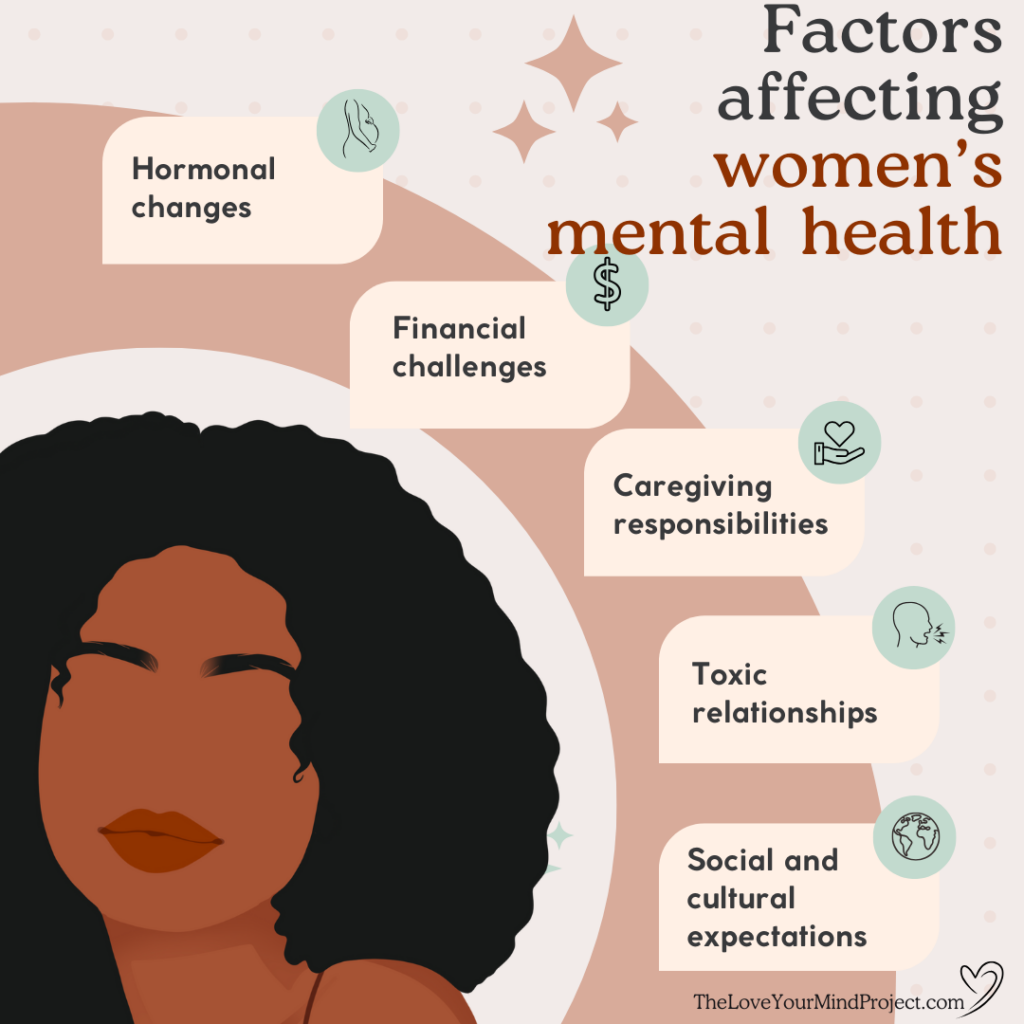- How to help a friend with depression: Ways Black women can be supportive without carrying the whole load - December 12, 2025
- Why do I feel anxious when I wake up? What’s behind it and how to find calm in the morning - December 4, 2025
- How does anxiety medication work? What Black women should know before we decide - November 29, 2025
Anxiety, depression, and eating disorders are just some of the mental health conditions affecting women – it’s okay to get help.

Women’s mental health conditions can look different. We face unique stigmas, discrimination, and societal and cultural pressures that can impact our emotional well-being.
Certain conditions are more common in women than men 1. While this can be due to a combination of factors, including gender bias in healthcare, it highlights the importance of understanding our mental health, the factors that impact it, and how to love and support our minds in the way we deserve.
What's in this article?
Factors affecting women’s mental health
What causes mental illness is not always straightforward. Scientists look at how our genetics, life experiences, and environment interact 2. Here are some of the factors that can impact women’s mental wellness.
- Hormonal changes: Lower levels of estrogen and progesterone, common during menstruation or menopause, can contribute to depression and anxiety in women 3.
- Financial challenges: Stressing debt, medical bills, or day-to-day expenses can feed depression and anxiety, especially if you’re underemployed or earning a low income.
- Caregiver responsibilities: Women, single or married, are more likely to be primary caregivers 4, whether taking care of an aging parent or other family member. The weight of this responsibility can come with excessive stress, anxiety, depression, and burnout.
- Toxic or volatile relationships: Intimate, platonic, or familial relationships where you’re manipulated, controlled, criticized, or abused (verbally or physically) can contribute to low self-esteem, self-worth, and isolation – common depression symptoms. Physical abuse can lead to post-traumatic stress disorder (PTSD).
- Societal and cultural expectations: Gender discrimination can impact our self-esteem. The effects of racism can lead to depression, anxiety, and PTSD 5.

Mental health conditions common in women
We each respond differently to life’s challenges. However, there are some commonalities in the types of mental health conditions women face.
Anxiety disorder
Anxiety disorder generally involves feeling fear or worry about future situations that aren’t necessarily life-threatening.
There are different types of anxiety disorders. Generalized anxiety disorder (GAD) is usually associated with being worried about or overwhelmed with everyday life, like your job, health, and family.
Panic disorder can include unexpected panic attacks. Phobias, a debilitating fear of specific things or situations, is also considered an anxiety disorder.
Not everyone experiences an anxiety disorder in the same way, but you may notice some of the following symptoms.
- Constant nervousness or restlessness.
- Fear- or worry-based thoughts that won’t go away.
- Irritability.
- Fatigue.
- Trouble sleeping.
- Muscle tension and headaches.
- Increased heart rate.
- Digestive discomfort.
Anxiety is a natural response to fear and uncertainty. But if it doesn’t go away or makes it difficult to sleep, eat, or handle your daily tasks, it may be an anxiety disorder. Discuss your symptoms with your doctor or a licensed mental health professional.
Depressive disorder
Depression can feel like lasting sadness or hopelessness. Certain types of depression are unique to women.
- Premenstrual dysphoric disorder: You may experience a depressed mood, like anger, irritability, or suicidal thoughts, a week or two before your menstrual cycle.
- Perinatal depression: This condition can occur during or after pregnancy. You may feel depression symptoms that make it challenging to take care of yourself or your baby.
- Perimenopause depression: Women transitioning into menopause can experience irritability, sadness, and anxiety.
Depression symptoms aren’t your typical “rainy day” feels. You may feel one or more of the following symptoms.
- Sadness or hopelessness.
- Easily angered or irritated.
- Loss of interest in things once enjoyed.
- Fatigue or lack of energy.
- Guilt, shame, worthlessness, or constant self-blame.
- Recurrent thoughts of death or suicide.
Relief from depression can feel impossible, especially if there’s shame attached or you’re expected to snap out of it or let it go.
But depression is not something you’re choosing. It’s not a sign of weakness or anything being wrong with you. Your mind is simply asking for help based on what you’ve experienced.
Talk to your doctor or a licensed mental health professional who can help you navigate what you’re feeling because you deserve to feel better.
For immediate help, text or call 988 to talk with a trained counselor with the Suicide and Crisis Lifeline. Conversations are confidential.
Eating disorders
An eating disorder goes beyond how much or how often you eat. It can involve stress, anxiety, shame, or guilt regarding your body weight, image, or shape – or food in general.
According to the American Psychiatric Association, some of the most common eating disorders in the U.S. are anorexia nervosa, bulimia nervosa, binge eating disorder, and avoidant restrictive food intake disorder.
There are several physical signs and symptoms of an eating disorder. Anorexia usually involves extremely restrictive eating. Bulimia nervosa can include purging or excessive exercising to get rid of the food. However, a huge contributor to this behavior is the thought pattern.
If you deal with an eating disorder, you may come across some of the following emotional or psychological symptoms.
- Low self-esteem and lack of self-worth, particularly around body image.
- Frequent self-criticism or self-blame.
- Feeling shame or guilt around food or eating.
- Excessive fear of gaining weight.
- A desire to punish yourself when you think you’ve overeaten.
Battling with an eating disorder may not even feel like a battle, but a logical way to control your behavior and achieve a result. But what generally underlies an eating disorder are negative thought patterns 6, like the feeling that you’re never good enough.
You can heal and recover with help. Talk with your doctor and a licensed therapist.
Post-traumatic stress disorder
When we experience life-altering events, it can take a while for our minds to process what happened and how deeply it impacts us. Post-traumatic stress disorder (PTSD) is persistent feelings of sadness, anger, and anxiety from a trauma.
Although commonly associated with military veterans, anyone, including women, can develop symptoms.
It’s common for women who’ve lived through physical or emotional abuse to experience PTSD symptoms. Natural disasters, traffic accidents, or other traumatic events or circumstances can also trigger symptoms.
The Mayo Clinic highlights general PTSD symptoms in four categories:
- Intrusive memories: Flashbacks, nightmares, or uncontrollable thoughts can cause you to rehash the experience over and over.
- Avoidance: You may stay away from everyday places or activities that remind you of the event.
- Negative changes in mood and thinking: A traumatic event can trigger negative thoughts and feelings toward yourself or others, like fear or anger – or you may feel emotionally numb.
- Changes in physical and emotional reactions: Also known as arousal symptoms, you may be easily startled, angered, or always on guard against danger. Self-destructive behavior, like excessive drinking, can also be a sign of PTSD.
With time and support, you can recover from PTSD. Share your symptoms with your doctor or a licensed therapist who can help you process your feelings.
Other mental disorders impacting women
Some mental health conditions show up in men and women equally, but the symptoms are more common for women, according to the National Institute of Mental Health.
- Bipolar disorder: Commonly identified as extreme mood swings, bipolar disorder can show up as moments of high energy, excitement, or irritability – and low moments of sadness, hopelessness, and depression.
- Schizophrenia: Delusions, hallucinations, and trouble thinking clearly are common symptoms of schizophrenia – a disorder that makes it difficult to recognize what is real and what is not.
- Obsessive-compulsive disorder (OCD): Obsessions can be persistent, unwanted thoughts and urges. Compulsions are generally behaviors that provide relief from obsessive thoughts. OCD rituals by themselves are not always harmful, but the underlying emotional stress can be overwhelming and debilitating.
You can break the silence and get help
Many medical doctors suggest you seek help for a mental health condition if your symptoms feel prolonged or they get in the way of your day-to-day activities.
But many women, especially in the Black community, suffer in silence.
We want to push through even the most severe symptoms because we think that’s what strong women do.
Or we add guilt and shame on top of our already heavy burden, comparing ourselves to how we or others think we should feel.
But what if you believed that tending to your mind actually makes you strong? When you have the tools to process and heal from pain, you build resilience, becoming a real strong Black woman.
Start with your doctor, who can discuss your symptoms and health history to determine the best way to move forward. You can also talk with a licensed therapist.
Just know that life can feel better, and you deserve that.
Mental health conditions in women FAQs
What are the most common mental disorders in women?
Anxiety, depression, and eating disorders are mental health conditions that are more common in women than men. Disorders like post-partum depression, premenstrual dysphoric disorder, and perimenopause depression are unique to women. Drops in hormones like estrogen and progesterone can trigger these conditions.
How do I know if I have a mental disorder?
Medical doctors diagnose mental disorders. If you experience symptoms that make it challenging to do everyday tasks, like eat, sleep, or concentrate, talk with your doctor and consider the help of a licensed mental health professional.
What are the causes of mental illness?
Many scientists believe a combination of genetics, life experiences, and your environment can cause mental illnesses. A health professional will likely take a holistic approach, discussing your physical health, your family’s history of illness, and your experiences to understand your symptoms and arrive at a treatment plan that works for you.
References
1 Women and Mental Health. (2024, May 14). National Institute of Mental Health (NIMH). https://www.nimh.nih.gov/health/topics/women-and-mental-health
2 Mental Disorders. (2020). Medlineplus.gov; National Library of Medicine. https://medlineplus.gov/mentaldisorders.html
3 Can Menopause Cause Depression? (2024, June 20). Hopkinsmedicine.org. https://www.hopkinsmedicine.org/health/wellness-and-prevention/can-menopause-cause-depression
4 Sharma, N., Chakrabarti, S., & Grover, S. (2016). Gender differences in caregiving among family – caregivers of people with mental illnesses. World Journal of Psychiatry, 6(1), 7–7. https://doi.org/10.5498/wjp.v6.i1.7
5 M. Schouler-Ocak, D. Bhugra, Kastrup, M. C., Dom, G., Heinz, A., L. Küey, & P. Gorwood. (2021). Racism and mental health and the role of mental health professionals. European Psychiatry, 64(1). https://doi.org/10.1192/j.eurpsy.2021.2216
6 andy. (2022, January 11). Healthtalk. Healthtalk.org. https://healthtalk.org/experiences/eating-disorders/eating-disorders-and-thought-patterns/
